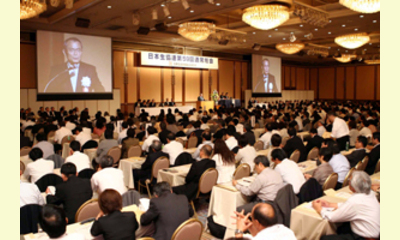|
|
Japanese Coop Members Favor Abolition of Nuclear Energy
an article by Japanese Consumers' Co-operative Union News
The Japanese Consumersí Co-operative Union has conducted a poll to ask members opinions regarding Japanís future energy, which will be submitted to the Government for consideration. The Japanese Consumer Co-operative is now the largest consumer union in Japan. It has 26.2 million members nationwide with a total turnover of about 3,322 billion yen and 49,416 employees as of 2010 FY. As a certain leader in local communities, co-ops propose and work for the settlement of new social systems.

A typical scene at the 59th General Assembly of JCCU
click on photo to enlarge
The TEPCO Fukushima Daiichi Nuclear Power Plant accident caused by the Tohoku Earthquake brought a huge damage and urged Co-op to reconsider its electricity and energy policy as well as members' life and Co-op businesses. The nuclear accident caused a huge damage in the region, such as widespread radiation contamination on food, water and others.
As the myth of the nuclear power plant's infallible safety collapsed, fundamental safety enhancement, strict disclosure and thorough risk communication have come up as current issues.
Countermeasures against the impact of the nuclear accident, including its conclusion, cause investigation, victim's compensation and recurrence prevention, are ongoing but still halfway.
The Japanese government and the Diet are proceeding for revision of the national energy policy. Meanwhile, social movement toward denuclearization of the energy sources is expanding.
In the questionnaire survey with co-op members, 51% agreed with 'abolition in the long run', 15% settled on 'early abolition' and 19% 'in status quo'.
In respect of electricity saving, 76% agreed with 'as much electricity saving as possible', while 23% agreed on 'aggressive saving by changing lifestyle drastically'.
|








|
DISCUSSION
Question(s) related to this article:
Is there a future for nuclear energy?,
* * * * *
Latest reader comment:
simple answer NO

|
|









